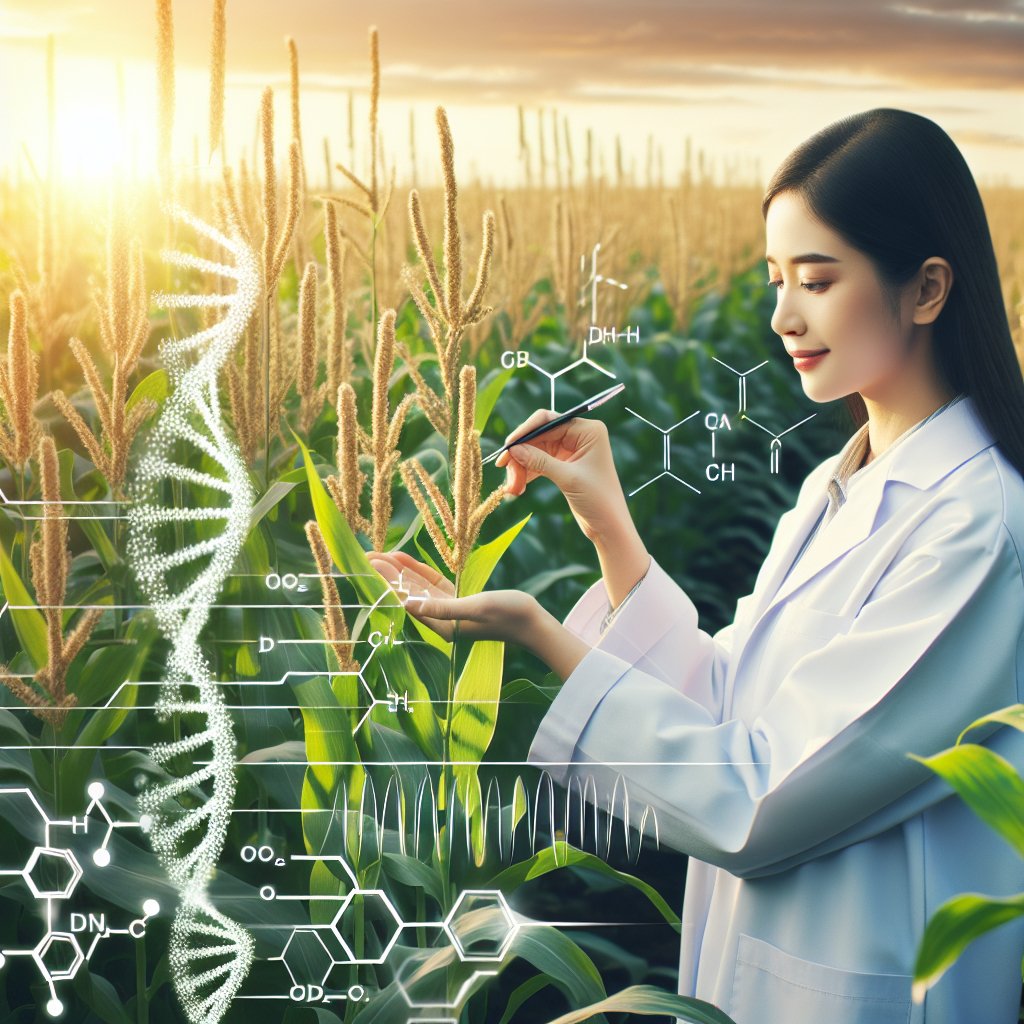Genetics plays a pivotal role in modern crop development, offering innovative solutions to enhance agricultural productivity and sustainability. As the global population continues to rise, the demand for food increases, necessitating advancements in crop development to ensure food security. This article delves into the significance of genetics in agriculture, exploring how genetic research and biotechnology are transforming the way we cultivate crops.
Understanding the Basics of Plant Genetics
Plant genetics is the study of genes, genetic variation, and heredity specifically in plants. It is a branch of biology that focuses on understanding how traits are passed from one generation to the next and how genetic information is expressed in plants. The knowledge gained from plant genetics is crucial for crop improvement, as it allows scientists to identify desirable traits and understand how they can be manipulated to enhance crop performance.
One of the fundamental concepts in plant genetics is the understanding of DNA, the molecule that carries genetic information. DNA is composed of sequences of nucleotides, which are organized into genes. These genes encode the instructions for building proteins, which are essential for the growth, development, and functioning of plants. By studying the genetic makeup of plants, researchers can identify specific genes associated with beneficial traits such as disease resistance, drought tolerance, and increased yield.
Advancements in genetic technologies, such as genome sequencing and gene editing, have revolutionized the field of plant genetics. Genome sequencing allows scientists to map the entire genetic code of a plant, providing a comprehensive understanding of its genetic makeup. This information is invaluable for identifying genes associated with important traits and for developing strategies to improve crop performance.
Applications of Genetics in Crop Development
The application of genetics in crop development has led to significant improvements in agricultural productivity and sustainability. One of the most notable advancements is the development of genetically modified organisms (GMOs). GMOs are plants that have been genetically engineered to possess specific traits, such as resistance to pests or tolerance to herbicides. This technology has allowed farmers to increase crop yields while reducing the need for chemical inputs, leading to more sustainable agricultural practices.
Another important application of genetics in crop development is marker-assisted selection (MAS). MAS is a technique that uses genetic markers to identify desirable traits in plants. By selecting plants with specific genetic markers, breeders can accelerate the process of developing new crop varieties with improved traits. This approach is particularly useful for traits that are difficult to measure directly, such as disease resistance or drought tolerance.
Gene editing technologies, such as CRISPR-Cas9, have also emerged as powerful tools for crop development. These technologies allow scientists to precisely edit the genetic code of plants, enabling the introduction of specific traits or the removal of undesirable ones. Gene editing has the potential to revolutionize crop development by allowing for the rapid and targeted improvement of crop varieties.
Challenges and Ethical Considerations
While the use of genetics in crop development offers numerous benefits, it also presents several challenges and ethical considerations. One of the primary concerns is the potential impact of genetically modified crops on the environment and biodiversity. There is ongoing debate about the long-term effects of GMOs on ecosystems and the potential for unintended consequences, such as the development of resistant pests or the loss of genetic diversity.
Another challenge is the public perception of genetically modified crops. Despite the scientific consensus on the safety of GMOs, there is still significant public skepticism and opposition to their use. This opposition is often fueled by concerns about the potential health risks of consuming genetically modified foods and the perceived lack of transparency in the development and regulation of GMOs.
Ethical considerations also arise in the context of intellectual property rights and access to genetic resources. The patenting of genetically modified crops and the control of genetic resources by a few large corporations have raised concerns about the concentration of power in the agricultural industry and the potential for exploitation of smallholder farmers.
The Future of Genetics in Agriculture
Despite these challenges, the future of genetics in agriculture is promising. Continued advancements in genetic technologies are expected to drive further improvements in crop development, leading to more resilient and productive agricultural systems. The integration of genetics with other emerging technologies, such as precision agriculture and digital farming, has the potential to transform the way we cultivate crops and manage agricultural landscapes.
One of the key areas of focus for future research is the development of crops that are better adapted to changing climate conditions. As the global climate continues to change, there is an urgent need for crops that can withstand extreme weather events, such as droughts and floods. Genetic research is playing a crucial role in identifying and developing crop varieties that are more resilient to these challenges.
Another important area of research is the development of crops with enhanced nutritional profiles. By understanding the genetic basis of nutrient content in plants, scientists can develop crop varieties that are richer in essential vitamins and minerals, contributing to improved human health and nutrition.
In conclusion, genetics is playing a transformative role in modern crop development, offering innovative solutions to enhance agricultural productivity and sustainability. While there are challenges and ethical considerations to address, the continued advancement of genetic technologies holds great promise for the future of agriculture. By harnessing the power of genetics, we can develop crops that are more resilient, productive, and nutritious, ensuring food security for future generations.
